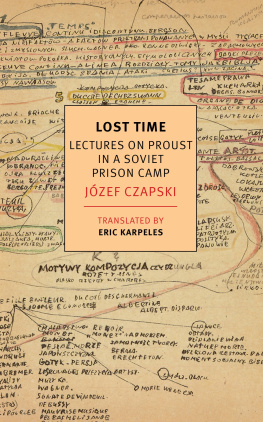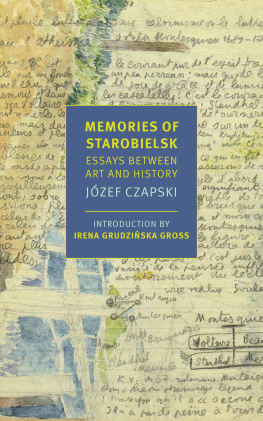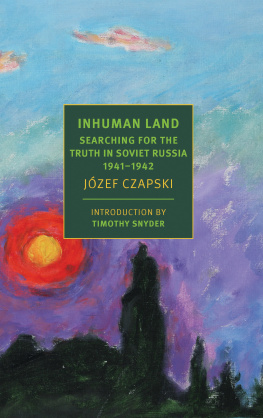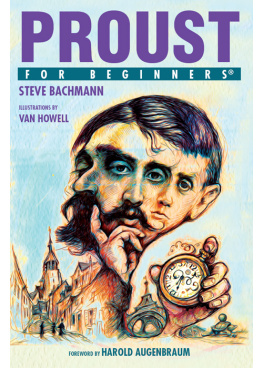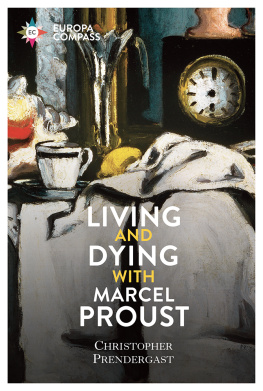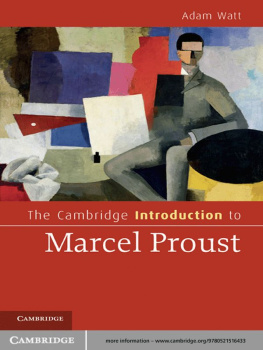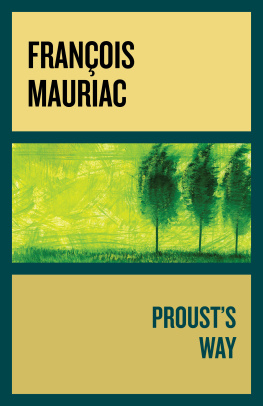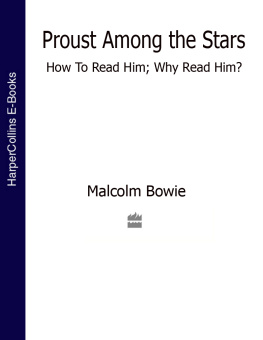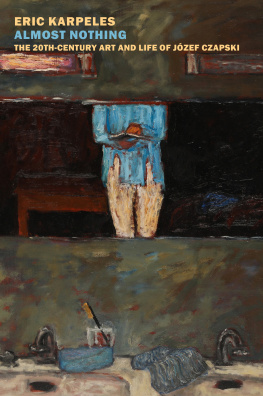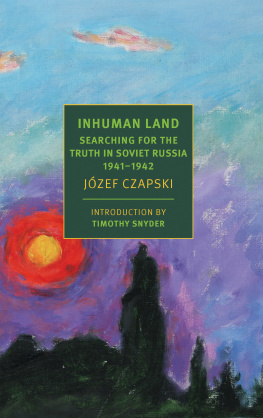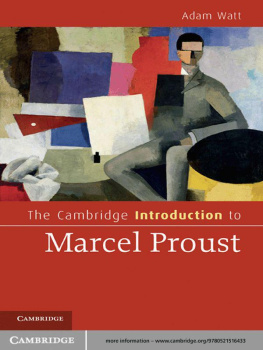
JZEF CZAPSKI (18961993), a painter and writer, and an eyewitness to the turbulent history of the twentieth century, was born into an aristocratic family in Prague and grew up in Poland under czarist domination. After receiving his baccalaureate in Saint Petersburg, he went on to study law at Imperial University and was present during the February Revolution of 1917. Briefly a cavalry officer in World War I, decorated for bravery in the Polish-Soviet War, Czapski went on to attend the Academy of Fine Arts in Krakw and then moved to Paris to paint. He spent seven years in Paris, moving in social circles that included friends of Proust and Bonnard, and it was only in 1931 that he returned to Warsaw, and began exhibiting his work and writing art criticism. When Germany invaded Poland in September 1939, Czapski sought active duty as a reserve officer. Captured by the Germans, he was handed over to the Soviets as a prisoner of war, though for reasons that remain mysterious he was not among the twenty-two thousand Polish officers who were summarily executed by the Soviet secret police. Czapski described his experiences in the Soviet Union in two books: Memories of Starobielsk (forthcoming from NYRB) and Inhuman Land (available from NYRB), the latter of which describes his continuing efforts to find out what had happened to his missing and murdered colleagues. Unwilling to live in postwar communist Poland, Czapski set up a studio outside of Paris. His essays appeared in Kultura, the leading intellectual journal of the Polish emigration that he helped establish; his painting underwent a great final flowering in the 1980s. Czapski died, nearly blind, at ninety-six.
ERIC KARPELES is a painter who writes about visual and literary aesthetics. He is the author of Paintings in Proust: A Visual Companion to In Search of Lost Time and Almost Nothing: The 20th-Century Art and Life of Jzef Czapski and is a fellow of the Czesaw Miosz Institute at Claremont McKenna College.
LOST TIME
Lectures on Proust in a Soviet Prison Camp
JZEF CZAPSKI
Translated from the French by
ERIC KARPELES
NEW YORK REVIEW BOOKS

New York
THIS IS A NEW YORK REVIEW BOOK
PUBLISHED BY THE NEW YORK REVIEW OF BOOKS
435 Hudson Street, New York, NY 10014
www.nyrb.com
Copyright 1987 by Les ditions Noir sur Blanc
Translation and translators introduction copyright 2018 by Eric Karpeles Images copyright Weronika Orkisz
All rights reserved.
Cover image: Diagram from Jzef Czapskis Prison Notebook; Weronika Orkisz
Cover design: Katy Homans
First published in the French language as Proust contre la dchance: Confrences au camp de Griazowietz by Les ditions Noir sur Blanc

Library of Congress Cataloging-in-Publication Data
Names: Czapski, Jozef, 18961993, author. | Karpeles, Eric, writer of introduction, translator.
Title: Lost time : lectures on Proust in a Soviet prison camp / by Jozef Czapski ; introduction and translated by Eric Karpeles.
Description: New York : New York Review Books Classics, [2018].
Identifiers: LCCN 2018024070 (print) | LCCN 2018028507 (ebook) | ISBN 9781681372594 (epub) | ISBN 9781681372587 (paperback)
Subjects: LCSH: Proust, Marcel, 18711922. la recherche du temps perdu | Proust, Marcel, 18711922Aesthetics. | Prisoners writings, PolishTranslations into English. | BISAC: LITERARY CRITICISM / European / French.
Classification: LCC PQ2631.R63 (ebook) | LCC PQ2631.R63 A7848 2018 (print) | DDC 843/.912dc23
LC record available at https://lccn.loc.gov/2018024070
ISBN 978-1-68137-259-4
v1.0
For a complete list of titles, visit www.nyrb.com or write to:
Catalog Requests, NYRB, 435 Hudson Street, New York, NY 10014
for Steven Barclay
and
Mikoaj Nowak-Rogoziski
CONTENTS
TRANSLATORS INTRODUCTION
There is some Proust in me, and through Proust, bit by bit, I become aware of my own possibilities.
Jzef Czapski, wartime journal entry
M OST READERS will have picked up this book in response to the name Marcel Proust. Such was the case for me when I first came upon the original French version. Studies of Prousts life and work continue to proliferate: twentieth- and twenty-first-century literature is unthinkable without Proust; his eminence is indisputable. By contrast, the Polish painter and writer Jzef Czapski (18961993) is virtually unknown to readers of English, yet when I first read this slender volume he lingered in my mind, a presence of sufficient interest to eclipse, albeit momentarily, the blinding sun of Proust. This books resonant power derives in part from what it tells us about the Parisian novelist, but it is the particulars of Czapskis celebration of him that fascinate.
A titled aristocrat by birth, Czapski first arrived in Paris from Krakw in 1924, a penniless painter at the start of a long career. (His familys estates and large fortune had been seized by the newly amalgamated Soviet Union.) A great reader, he immersed himself in contemporary French writing. Proust, already legendary, had been dead for little more than a year. Randomly picking up one of the early volumes of la recherche du temps perdu, Czapski was initially put off by what he found to be an excess of style, but trying again not many months later, in the aftermath of a failed romance, Czapski would find in Prousts novel the intense release that he required. Burying himself in its pages, he developed a profound admiration for the work that would never diminish.
Over the years, his growing circle of Parisian acquaintances came to include several of Prousts old friends. The poet Lon-Paul Fargue entertained Czapski with stories of the elusive writer who lived as a recluse (a recluse who liked, occasionally, to dine at the Ritz). Franois Mauriac, novelist and critic, welcomed the young Polish painter into a group taking up the cause of spirituality in modern art. Daniel Halvy, twenty-four years Czapskis senior, had been the recipient of several audacious love letters from Proust while they were still schoolmates at Lyce Condorcet, as well as the subject of a purple poem called Pederasty, in which the seventeen-year-old budding writer praised his friends adolescent beauty and his sweet limbs. Czapski would remain a loyal friend of Halvys for over thirty years.
Prousts spirit was perhaps most vividly brought to life through Czapskis affectionate connection with Maria Godebska-Sert, known to one and all as Misia. A great beauty of Polish descent, Misia, the cherished confidante of Coco Chanel and Sergei Diaghilev, reigned supreme in the beau monde for many decades. An accomplished pianist who had known Franz Liszt and studied with Gabriel Faur, she was a hostess of wit, intelligence, and charm, a source of envy and dismay to every fashionable Parisienne. Misias zaftig physique and stylish chic are immediately recognizable in dozens of portraits painted by her friends douard Vuillard, Pierre Bonnard, Auguste Renoir, Pablo Picasso, and Henri de Toulouse-Lautrec. Her first husband, Thade Natanson, with his brothers, launched La Revue blanche, a sumptuously illustrated literary journal in whose pages their precocious friend Marcel Proust published his first writings. In la recherche, Misia would be transformed into the exotic Princess Yourbeletieff.
With a characteristic mixture of reluctance and determination, Czapski approached this paragon of high society to ask if she would consider hosting an event to benefit his small band of struggling Polish painters, each of whom dreamed of prolonging their stay in Paris. Heartily agreeing, Misia persuaded Picasso to help; together they drew up a list of distinguished guests to invite.

